
Proud of Our People! Fyodor Tyutchev: Poet, Philosopher, Diplomat
/ Главная / Russkiy Mir Foundation / Publications / Proud of Our People! Fyodor Tyutchev: Poet, Philosopher, DiplomatProud of Our People! Fyodor Tyutchev: Poet, Philosopher, Diplomat
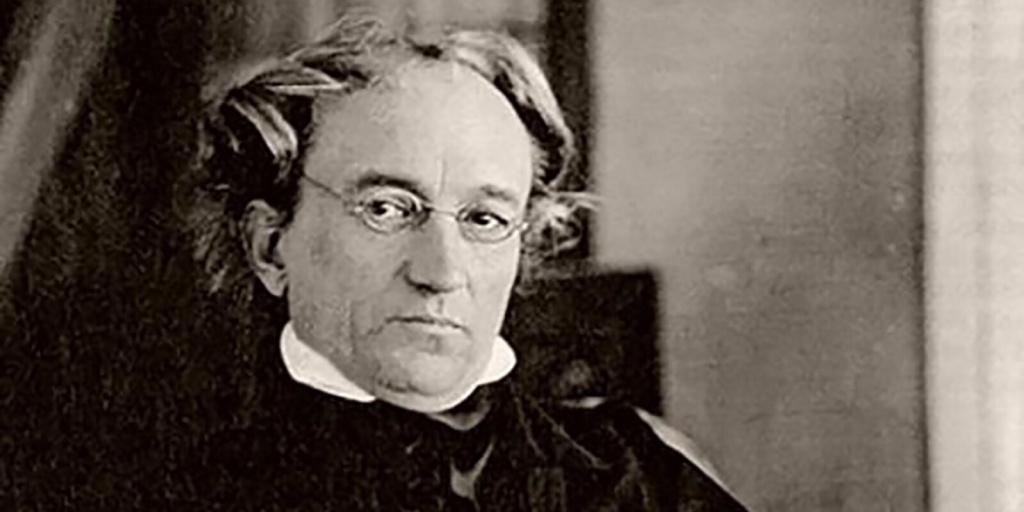
Fyodor Tyutchev, daguerreotype. 1848-1849. Fragment / mos.ru (CC BY 4.0)
Probably everyone has heard the famous lines "Russia is a thing of which the intellect cannot conceive..." by Fyodor Tyutchev at least once. December, 5 marks the 220th anniversary of the poet's birth. Yet, he never considered poetry to be his life's mission and was preoccupied with matters of a global scale. Mr.Tyutchev fought his war focusing on relations between Russia and the West, the origins of mutual misunderstanding, and the origins of Russophobia. When you read his works today, it feels as though he saw things coming in a crystal ball...
Translating Horace's odes at the age of 12
Fyodor Tyutchev was born at the ancestral manor Ovstug in the Orel province on December, 5 (November 23, O.S.), 1803. The Tyutchev family was known since the 14th century and shared a kinship with many famous families of that time. For instance, Fyodor Tyutchev had a distant family connection to another Russian literary classic, Leo Tolstoy.
The family was very harmonious and loving. Mikhail Pogodin, a historian who often visited them, wrote, "Looking at the Tyutchevs, I was thinking about family happiness. If only everyone lived as simply as they did".
When Fyodor was 9, Semyon Raich, a poet, translator, and expert in Ancient Greek, Latin, and Italian, became his home teacher. A couple of years later, the smart boy was translating Horace's odes. He was very successful, and was admitted to the Russian Literature Appreciation Society at the age of 14. At the same time, the talented young man started attending lectures at the Literature Department of Moscow University, becoming a regular student at the age of 15. "It was obvious that studying didn't involve hard work for him but rather the satisfaction of a natural thirst for knowledge," wrote Ivan Aksakov who knew Fyodor well.
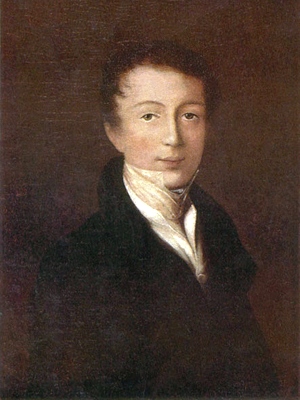
Portrait of Fyodor Tyutchev by an unknown artist, early 1820s
“No human being has ever loved another the way she loves me”
Having graduated from university a year ahead of schedule, Fyodor Tyutchev began his diplomatic career in the State Board of Foreign Affairs. A year later, the young official was selected to serve in the Russian diplomatic mission in Munich at the recommendation of his uncle, General Osterman-Tolstoy, a hero of the 1812 Patriotic War. Mr. Tyutchev spent in Bavaria more than 20 very happy years. He was someone seen as a foreigner and a "pure product of Europeism" in his homeland. His first and second wives were Germans. However, he was the one who threw down a gauntlet before enlightened Europe and described it as "a civilization that destroys itself with its own hands" (Mr. Tyutchev's article "Russia and the Revolution").
Truth be told, the 20 years he spent in Europe were mostly centered around his romantic experiences. Once he arrived, Mr. Tyutchev fell in love with 15-year-old Amalia Lerchenfeld who later acted as his guardian angel more than once. She was his first and probably the strongest love of his life.
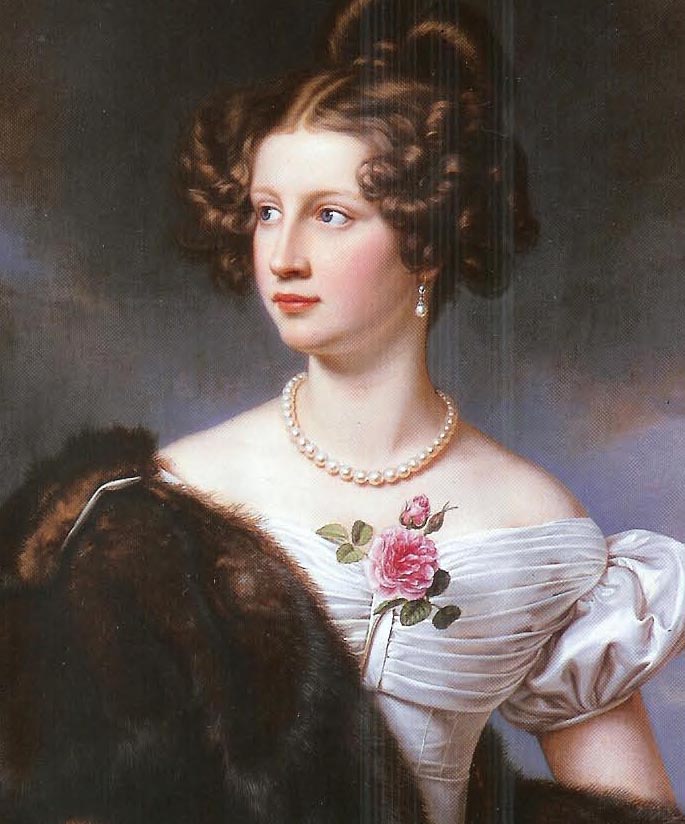
Amalia von Krüdener, née Lerchenfeld. Portrait by Joseph Karl Stieler
It was Amalia who Mr. Tyutchev dedicated these heartfelt verses:
I met you and the past
came back to life in my dead heart.
Remembering a golden time,
my heart became so warm.
..........
That was more than reminiscence:
my life began to talk once more,
as did in you that very same charm,
as did in my soul that very same love!
(Translated by Frank Jude)
It should be noted that the poet wrote these words to his former lover in 1870, almost 50 years after their affair. Once he wrote the following words about Amalia, "She is my longest-standing love after Russia."
Yet, he married another woman. Eleonore Peterson was the widow of a Russian diplomat. She had four children from her first husband and was passionately in love with the young diplomat. They married secretly and revealed their union only a couple of years later. "...No human being has ever loved another the way she loves me... there has been no day in her life when she would not have agreed to die for me, for the sake of my well-being, without any hesitation," he wrote to his parents about his wife.
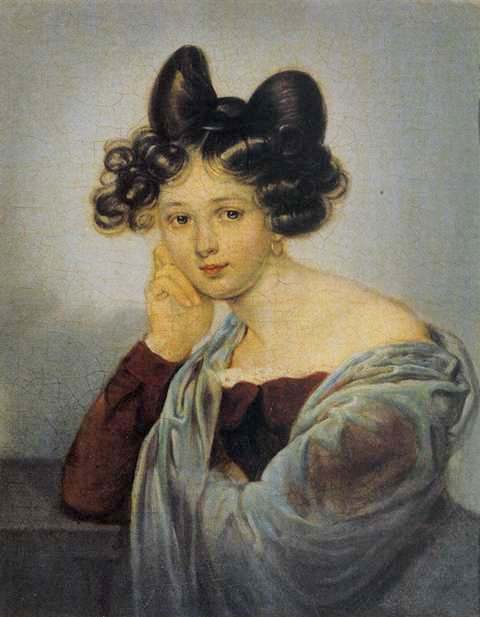
Eleonore, Fyodor Tyutchev's first wife. Mid 1820s.
A few years later, however, Mr. Tyutchev met another lady who took his heart - Ernestine von Dörnberg. Having found out about it, Eleonore even attempted to stab herself with a decorative dagger found on her husband's desk. Fyodor Tyutchev promised her to break up with his mistress. In 1838 Eleonore died. Mr. Tyutchev confessed that he had turned gray overnight. Nevertheless, in 1839 he married his former lover - Ernestine.
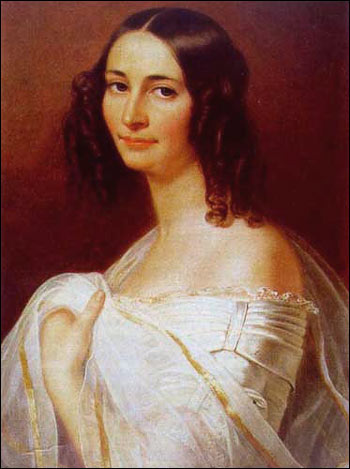
Ernestine, the poet's second wife
Ernestine played a crucial role in an episode where Fyodor Tyutchev was on the brink of exile to Siberia. As a diplomat in charge of the Russian mission in Turin, he neglected his duties due to love affairs and closed the consulate. Rumors circulated that he had even misplaced secret ambassadorial ciphers. Having the risk of losing office and facing exile, Tyutchev had influential protectors, including Amalia Lerchenfeld, the wife of a high-ranking official from the Ministry of Foreign Affairs.
“Russia's true defender is history”
Fyodor Tyutchev was enjoying a happy family life for five years. At some point, however, he realized that he wanted to come back to Russia. Besides, having lived in Europe and observed all the complex twists and turns in the relations between Russia and the West, Mr. Tyutchev came to the idea that Europeans do not understand Russia. He wrote well-known lines, “Russia is a thing of which the intellect cannot conceive. Hers is no common yardstick. You measure her uniquely: in Russia you believe!” much later, in 1866, having realized that attempts to prove something to someone would be pointless. Yet, in 1844, he was eager to explain Russia's mission and position in the world to Europe.
With these thoughts and the desire to rejoin the public service, Mr. Tyutchev met Alexander von Benckendorff, the omnipotent chief of the secret police of the Russian Empire. The meeting with the high-ranking official took place in the estate of Amalia, his long-standing love. Mr. Tyutchev shared his reflections and proposals on improving Russia's image abroad.
Tyutchev believed that it was necessary to address issues of relations between Russia and the European powers in the European press. Soon there came a rather suitable occasion. Having visited Russia, Marquis de Custine wrote a vicious libel about his trip.
Mr. Tyutchev did not answer him directly considering it beneath his dignity. Instead, he wrote an article "Letter to Dr. Gustav Kolb, Editor of the Allgemeine Zeitung". He described de Custine's book as "another testimony of shameless mind and spiritual corruption when the most important and paramount matters are discussed based on emotional irritation rather on reason." The poet did not find it necessary to enter into polemics with such a prejudiced author, moreover, he believed Russia did not need his advocacy, "My letter is not intended to be the Russia's Apologia. Russia's Apologia... My God! A master took on this task and has so far been quite successful. Russia's true defender is history. It has managed to turn all ordeals in Russia's mysterious destiny into the country's advantage for three centuries now.”
Both Alexander von Benckendorff and Emperor Nicholas I thoroughly endorsed Mr. Tyutchev's views. He rejoined the Ministry of Foreign Affairs and was appointed senior censor. His duties were to decide on works allowed to be translated and published in Russia. For instance, Mr. Tyutchev, as a censor, banned Das Kapital by Karl Marx. His short review read, "Those who want to read it will read in German, otherwise it's just a dabble." Well, we know that those "who wanted", read it, and the prohibition on publishing could not change anything.
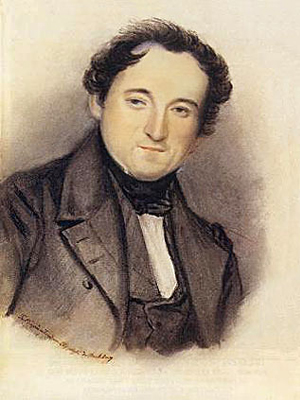
Portrait of Fyodor Tyutchev by Hippolyte de Rechberg, 1838.
“The West is leaving the stage, everything is collapsing and perishing in a global conflagration”
In 1848, another revolution broke out in the European countries. Nicholas I felt oppressed by it as the peace established after the defeat of Napoleon's army in Europe seemed close to collapse once again. Furthermore, anti-Russian initiatives were actively developing in Europe. France wanted to take revenge for 1812, Polish nationalists hoped to take Poland back from Russia.
Having lived in Europe for many years, Fyodor Tyutchev was aware of those sentiments and their potential consequences. He wrote an article "Russia and the Revolution" and stated the following: "Understanding the essence of the tremendous upheaval in Europe today requires mentioning these facts. There have been only two effective forces in Europe for quite a while: the Revolution and Russia. These two forces oppose each other today and may clash with each other tomorrow. No agreement or treaty is possible between them. The survival of one means the death of the other. The entire political and religious future of mankind depends on the outcome of this struggle between them, the greatest struggle the world has ever seen."
Mr. Tyutchev had no doubt about the outcome of this upcoming confrontation, "Has Russia's mission ever been clearer and more evident? The Lord inscribed it with fiery arrows in the Heavens darkened by storms. The West is leaving the stage, everything is collapsing and perishing in a global conflagration — Charlemagne's Europe and the Europe of the 1815 Treatises, the Roman Papacy and all the Western kingdoms, Catholicism and Protestantism, lost faith and insane minds, the impossible order and the impossible freedom. There is a civilization that destroys itself with its own hands standing over the ruins it has piled up... When we see a colossal Empire rising up over such a huge wreck like the Holy Ark, who would dare to doubt its mission? And should we, its children, be faithless and feeble-minded?"
According to Fyodor Tyutchev, "First of all, Russia is a Christian power, and Russian people are Christians not only because of their Orthodox beliefs but also because of something even more heartwarming. Self-denial and self-sacrifice are inherent in them, which form the basis of their moral nature. Yet, the Revolution is an enemy of Christianity. The anti-Christian spirit is the Revolution's soul, its essential, distinctive characteristic. Its continuously revised formats and slogans, even its violence and crimes are of a particular and incidental nature. It is the anti-Christian origin that makes it alive and gives it such a formidable power over the world.” Mr. Tyutchev believed that Russia could withstand even the battle with the Antichrist because the historical law controls its fate. He said that "it was Russia's swore enemies who contributed to the development of its greatness with the utmost success."
“Be faithful to yourself, justify your deeds to God …”
In 1854, the Crimean War began, which was a failure for Russia. The same year, Fyodor Tyutchev wrote, "Well, we are fighting with the whole of Europe united against us as an alliance. However, the alliance is a wrong word, the actual term is conspiracy..." His verses express it even more harshly:
You're not in the mood for verses,
our kindred, Russian tongue!
The harvest is ripe, the reaper is ready,
an unearthly time has come to pass.
Lies have become steel incarnate.
God has somehow allowed
not a whole world to threaten you with calamity,
but an entire hell to threaten your downfall!
Every blasphemous mind
and every-God-reviling race
has dredged up monarchies of murk
in the name of light and freedom!
Preparing a cell for you,
they foretell your ignominy,
yours, the Word, life, enlightenment
of better days to come!
Oh, in this stern trial,
in this final, fateful struggle,
be faithful to yourself,
justify your deeds to God.…
(Translated by Frank Jude)
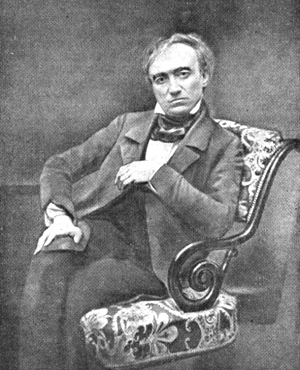
Fyodor Tyutchev. Daguerreotype. Around 1850.
Mr. Tyutchev saw an anti-Russian conspiracy not only within Europe but also in Russia. Foreign Minister Karl Nesselrode provided the Emperor with misleading information about the state of affairs. When the Crimean War was lost and Sevastopol fell, Chancellor Nesselrode congratulated his friends on the possibility of traveling to Italy again and having fun in Paris. Mr. Tyutchev expressed his rage in a letter, "What rascals!" In early 1856, Karl Nesselrode was finally removed from his post, and his place was taken by Prince Gorchakov who was on friendly terms with the poet.
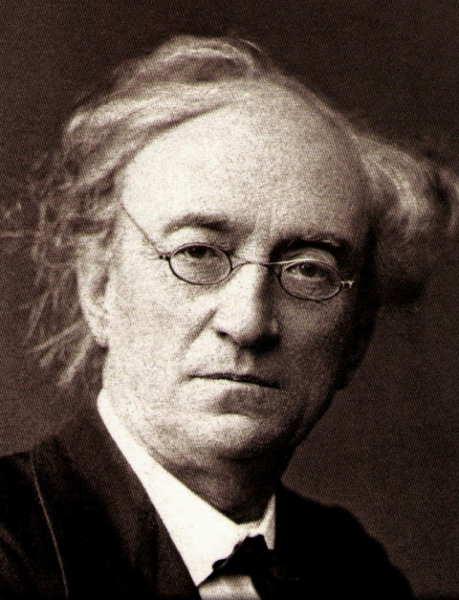
Photo credit: A.M. Gorky Literary Institute
“Blessed is he who visits this life at its fateful moments of strife …”
Nevertheless, Fyodor Tyutchev is known as one of the great poets in Russian history. He did not give much importance to his gift and certainly did not consider it his life's mission. The poet was 51 years old when his first poetry collection was published, thanks to Nikolay Nekrasov who admired Fyodor Tyutchev's poetry. The circulation of 3,000 copies was sold out quite quickly although it was quite large for those times. In the twilight of his life, the poet wrote love lyrics. He was in a relationship with his muse, Elena Denisyeva, for 15 years, until she passed away. When she died of tuberculosis, the poet suffered from unbearable grief. "His sufferings are sacred to me regardless of the reason behind them," his wife Ernestine wrote in her letter. Yes, his women loved him with exceptional devotion and commitment…
As to his career, Mr. Tyutchev achieved a lot. He was promoted to the rank of Privy Councillor (a higher rank was only the Chancellor). He served the Fatherland until his death despite being seriously ill. He was keenly interested in world events up to his final moment. Mr. Tyutchev ironically confessed to his daughter, "Being hopelessly light-minded, I still cannot help but be curious about everything that goes on in the world, as if I were not about to leave it soon..."
… In his early years, Fyodor Tyutchev composed verses that possess a prophetic quality, remaining just as pertinent in our present day.
Blessed is he who visits this life
at its fateful moments of strife:
the all-wise sent him an invitation
to speak with them at their celebrations.
He’s the witness of high affairs,
knows their councils, sits on them,
and a living god while there,
has drunk immortality with them.
(Cicero, Translated by Frank Jude)
New publications

 Mikhail Kalatozov, a director who transformed the world of cinematography in many ways, was born 120 years ago. He was a Soviet film official and a propagandist. Above all, he was capable of producing movies that struck viewers with their power and poetic language.
Mikhail Kalatozov, a director who transformed the world of cinematography in many ways, was born 120 years ago. He was a Soviet film official and a propagandist. Above all, he was capable of producing movies that struck viewers with their power and poetic language.  Ukrainian authorities have launched a persecution campaign against the canonical Ukrainian Orthodox Church (UOC), the biggest one in the country's modern history. Over the past year, state sanctions were imposed on clergy representatives, searches were conducted in churches, clergymen were arrested, criminal cases were initiated, the activity of the UOC was banned in various regions of the country, and monasteries and churches were seized.
Ukrainian authorities have launched a persecution campaign against the canonical Ukrainian Orthodox Church (UOC), the biggest one in the country's modern history. Over the past year, state sanctions were imposed on clergy representatives, searches were conducted in churches, clergymen were arrested, criminal cases were initiated, the activity of the UOC was banned in various regions of the country, and monasteries and churches were seized.  When Nektary Kotlyaroff, a fourth-generation Russian Australian and founder of the Russian Orthodox Choir in Sydney, first visited Russia, the first person he spoke to was a cab driver at the airport. Having heard that Nektariy's ancestors left Russia more than 100 years ago, the driver was astonished, "How come you haven't forgotten the Russian language?" Nektary Kotlyaroff repeated his answer in an interview with the Russkiy Mir. His affinity to the Orthodox Church (many of his ancestors and relatives were priests) and the traditions of a large Russian family brought from Russia helped him to preserve the Russian language.
When Nektary Kotlyaroff, a fourth-generation Russian Australian and founder of the Russian Orthodox Choir in Sydney, first visited Russia, the first person he spoke to was a cab driver at the airport. Having heard that Nektariy's ancestors left Russia more than 100 years ago, the driver was astonished, "How come you haven't forgotten the Russian language?" Nektary Kotlyaroff repeated his answer in an interview with the Russkiy Mir. His affinity to the Orthodox Church (many of his ancestors and relatives were priests) and the traditions of a large Russian family brought from Russia helped him to preserve the Russian language.

 The leaders of the Friends of the Great Russia cultural association (Amici Della Grande Russia) in Italy believe that the Western policy of abolishing Russian culture in Europe has finally failed. Furthermore, it was doomed to failure from the beginning.
The leaders of the Friends of the Great Russia cultural association (Amici Della Grande Russia) in Italy believe that the Western policy of abolishing Russian culture in Europe has finally failed. Furthermore, it was doomed to failure from the beginning.  Name of Vladimir Nemirovich-Danchenko is inscribed in the history of Russian theater along with Konstantin Stanislavski, the other founding father of the Moscow Art Theater. Nevertheless, Mr. Nemirovich-Danchenko was a renowned writer, playwright, and theater teacher even before their famous meeting in the Slavic Bazaar restaurant. Furthermore, it was Mr. Nemirovich-Danchenko who came up with the idea of establishing a new "people's" theater believing that the theater could become a "department of public education."
Name of Vladimir Nemirovich-Danchenko is inscribed in the history of Russian theater along with Konstantin Stanislavski, the other founding father of the Moscow Art Theater. Nevertheless, Mr. Nemirovich-Danchenko was a renowned writer, playwright, and theater teacher even before their famous meeting in the Slavic Bazaar restaurant. Furthermore, it was Mr. Nemirovich-Danchenko who came up with the idea of establishing a new "people's" theater believing that the theater could become a "department of public education."